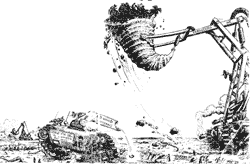 Aid dependency in Nepal poses many problems. One that's rarely considered, yet has a huge impact, arises from the pursuit of top local talent by the various international agencies here. Now it's natural for these well resourced, ostensibly well-meaning organisations to want the best and the brightest of local graduates and those lucky enough to be schooled abroad.
Aid dependency in Nepal poses many problems. One that's rarely considered, yet has a huge impact, arises from the pursuit of top local talent by the various international agencies here. Now it's natural for these well resourced, ostensibly well-meaning organisations to want the best and the brightest of local graduates and those lucky enough to be schooled abroad. But in Kathmandu, the aidocracy seems to have no regard for the consequences of hiring policies. Adding insult to injury, just to top it off, most international organisations practise a form of financial apartheid by maintaining vast salary differentials between foreign and locally hired staff.
The first thing to note is that ambitious Nepali graduates have few options if they don't want to earn the pittances paid by most indigenous companies. Many of those firms earn lavish profits in Nepal so their low pay rates are indefensible. Those who pay labour market distorting salaries in the aid and development sector can claim-with some justification-good intentions. But only up to a point or two.
First there's the brain drain of local talent, business liberal arts and science graduates who might be inclined to do something for the good of their country or society that isn't funded and directed by foreign money. Those people who should be social activists, environmentalists, reformers are instead pushing paper and learning jargon in an international organisation. Memorising acronyms and acting as 'gatekeepers' for careerist officials from abroad eager to keep moving the ladder braced firmly in the green green grass of home.
Then there's the effect of the aid sector's need for media coverage and dissemination on film making, writing and local arts like drama or music-all pressed into the service of selling a message dreamt up in London or Rome. My friends who follow folk music tell me that much of that genre is wrecked by the heavy handed insertion of environmental or gender-sensitive messages into the traditional arrangements of the countryside. People who should be producing hard-hitting documentaries on corruption among the real elite of this country are instead working alongside them, making soft focus films praising the work of international organisations in this slough of indigenous despond that is Nepal. That's the message I get from almost every single film made for aid. "Things were terrible until our program with the long, stupid acronym came along and liberated the..."
Political talent best suited for acitivism, union organising or pushing for social change among Nepalis who need it, gets squandered in pseudo-reforming activities like studying how the existing policies of market fundamentalist international financial institutions can survive beyond the latest trend in aid think. Huge agencies like the International Monetary Fund or the World Bank, that push socially damaging neo-liberal economic nonsense, hire Nepalis and use top local people to make sure that they can keep doing the same thing while somehow seeming kinder and gentler.
This is a net loss to the country, not just because it prevents real change in the approach of the IFIs. Nepal's political parties, for example, go wanting for fresh talent that isn't sycophantic or mediocre. The old guard goes unchallenged.
The hypocrisy of it all is stunning, especially when you consider the issue of salary differentials. The 'best and brightest' that do get hired as staff or consultants, more often than not, earn far less than their foreign appointed colleagues. Nor do local hires get living expenses, school fees, rent or transport reimbursed, not to mention tax relief. Taking those perks into account, highly paid foreign hires in front line aid agencies earn twice, thrice or more than their Nepali colleagues.
There are a few praiseworthy exceptions, like ICIMOD, that espouse salarial equality, but these are few and far between among the acronymic aid agencies of this Valley.
I'm proud to say this newspaper pays me the same as anyone else who works here, just in case someone was thinking of writing to the editor about that. And I'd really believe in the development mission of the international crowd here if they'd seriously address some of the issues raised above by doing a long, comprehensive study of their impact on Nepal. A study done by Nepalis paid as much as anyone else. And then-radical thinking, I know-released to the public so we can all learn the truth.



